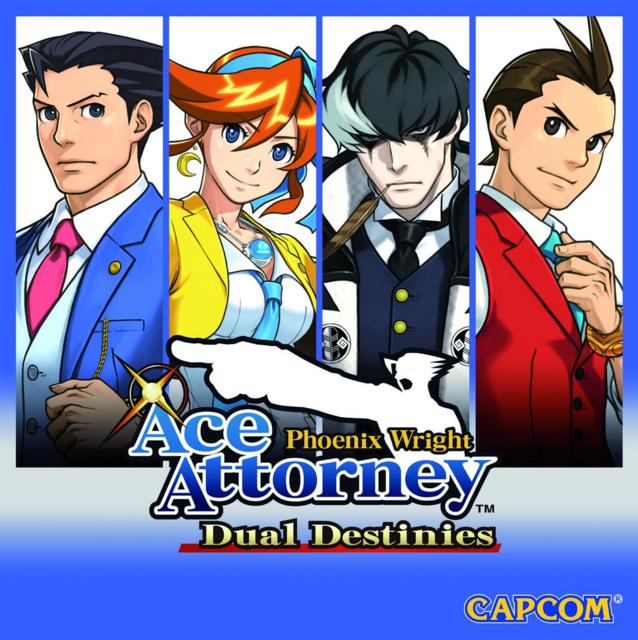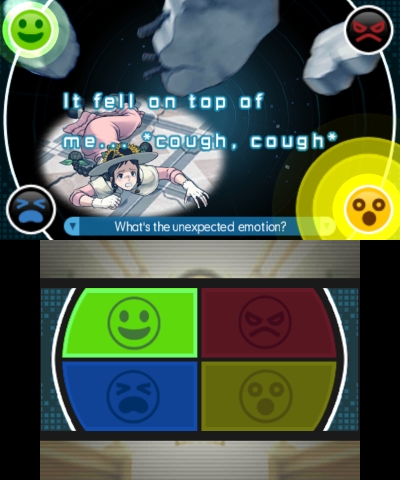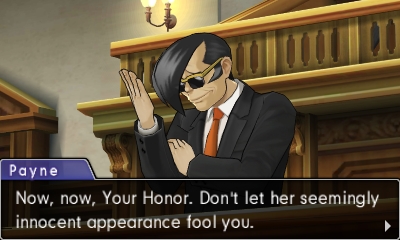Bucketlog April: Phoenix Wright: Ace Attorney - Dual Destinies
By Mento 2 Comments
Welcome to the Bucketlog! It's going to be 2019's year-long blog series, focusing on games I've been meaning to play since forever. I've put together a list derived from a mix of systems, genres, and vintages because it's starting to look like 2019 might be the first "lean" year for games in a spell (though time will tell whether that pans out to be true) and I figured this would be a fine opportunity to finally tick off a few items I've had on my various backlog lists/spreadsheets for longer than I'd care to admit.
April

- Game: Capcom's Phoenix Wright: Ace Attorney - Dual Destinies
- System: 3DS.
- Original Release: 2013-07-25 (Japan).
- Time from Release to Completion: Five years, nine months, and five days.
Man, is it great to be back in the courtroom again. Back in the mid-00s, I was blown away and subsequently addicted to the adventures of Phoenix Wright as he trounced his prosecutor opponents with a mix of gumption, luck, and insight, all delivered with a heightened sense of drama thanks to the expressive character animations of the artists and the frantic "Cornered" music by the sound team. Never a company to shy away from spectacle, Capcom lent their bombastic, over-the-top superhero earnestness honed in franchises like Mega Man and Street Fighter to a series of whodunnit adventure games and it ended up being a perfect merger of ideas shaped by the vision of series creator Shu Takumi.
After that original trilogy, I sought out the various games to follow - Ace Attorney Investigations: Miles Edgeworth, which focused more on the franchise's "Investigation" stage of clue-gathering that featured Phoenix's original prosecutor rival as its prickly hero, and Apollo Justice: Ace Attorney, the successor game to the Phoenix Wright trilogy featuring a new defense attorney protagonist - but after that was a gap where several new games, like the Edgeworth sequel and the Professor Layton crossover, simply failed to appear or wouldn't do so for several years after its original Japanese release. I kind of lost track with the franchise in that dark time. Turns out the series hadn't gone anywhere; it just became a little more elusive. Two more Ace Attorney sequels appeared exclusively on the Nintendo 3DS's digital eShop service, maintaining a high price - as almost all Nintendo exclusive products invariably seem to do - until relatively recently. I swept up both in the past couple of years and have been looking for an excuse to yell all my "Objection!"s and "Take That!"s again.
Dual Destinies picks up a year after Apollo Justice and introduces a new attorney to the Wright Anything Agency that Wright founded with his adopted daughter Trucy: the highly perceptive (but a little overenthusiastic) Athena Cykes. As with Apollo and Phoenix, Athena has a special skill that is sometimes required for witness testimonies and interviews: she's able to perceive subtle variations to someone's emotional response to events, registering either their joy, anger, fear, and surprise. Many of the puzzles involving this system requires pointing out the particular emotion that doesn't belong there (and, in a few rare cases, an emotion that absolutely should be there but isn't). Since the game jumps around between protagonists - Phoenix, who still has Maya's magatama to sense when people are concealing secrets via their "psyche-locks"; Apollo, who can pick up when someone is lying and study their body language for "tells"; and now Athena - all these systems get a workout, expanding the game's repertoire of interrogation techniques. Mercifully, you aren't given the usual demerits for messing these sequences up, unlike presenting the wrong evidence during testimonies.

In fact, the whole game feels modernized in that and several other ways. The most immediately striking is the leap to the 3DS platform, which allows for 3D renderings of every scene. That also means that the expressive 2D animated portraits for characters have been replaced with 3D models, but fortunately they don't lose too much of their cartoonish over-exaggeration in the process. I was a little concerned by this because something similar happened with the third Zero Escape game - Zero Time Dilemma - and the switch to mostly impassive 3D models robbed its many dialogue scenes of a lot of character. There's still some of that loss of "flavor" here when it comes to the game's typically eccentric cast of characters and their outbursts (especially the trademark breakdowns of suspects once you've finally nailed them), but the developers either anticipated it a little better or simply had more money to work with than the Zero Escape devs to make those models work. The other advancement is a little more subtle: a bevvy of user-friendly additions that makes the game far less of a crapshoot than it was previously. In fact, they might even go too far in making the game as accessible as possible: the game features a "notes" system that tells you what to do next during investigations, from vague directions like "go here" to more explicit "present this piece of evidence to this specific person"; important areas like crime scenes, when fully exhausted of anything noteworthy, will spring up a "well, we're all done here" message to let you know when to move on (and will, in fact, automatically end the room searching sequence); evidence left over from the previous day's trial that will not be relevant for the next is automatically filtered out of the player's inventory; and the aforementioned lack of penalties for the special skills. I didn't mind any one of these changes, per se, but it did reduce the overall challenge level considerably. Honestly, though, that the game told me that I only ever need to "present" one or two pieces of evidence to a character before I was done, rather than letting me try all dozen pieces in my possession in case one of them turned out to be relevant, really hurried things along and not in a bad way. It did make the game feel more like a visual novel than those previous however, especially with how quickly the investigation stages seemed to fly by.
The cases and characters introduced in Dual Destinies are a little weaker than they've been in the past, but only marginally. There's a distinct sense of familiarity with a lot of them: the new prosecutor, Simon Blackquill, who is a death row inmate with a samurai affectation (and his own bird of prey) feels like an amalgam of previous prosecutors, in particular the enigmatic tragic figure of Godot and the more aggressive tendencies of Franziska von Karma. Athena Cykes might as well be a distaff Apollo Justice: a well-meaning, occasionally goofy loudmouth with a knack for reading people. There's a case early on that hinges on a fictional character's actor identity - a masked wrestler rather than a TV superhero this time - and at no point was the true culprit of a case difficult to guess. That last point said, this series has always been more about the journey than the destination - several cases will reveal to the player who did it in the opening murder cutscene, allowing them to piece together the hows and whys at a later date - but as the fifth game in the series there's no escaping some similarities, and diminishing returns for same. They also completely side-stepped a certain big development at the end of Apollo Justice: Ace Attorney, with the game returning to the same system of laws and courts that it's always had, presumably for the sake of keeping things comfortably familiar. That honestly might be Dual Destinies's biggest drawback, though hardly one that sours the overall game too much.

In my view, the core of the Ace Attorney experience has always been the dramatic back-and-forths in the courtroom, where either the defense attorney or the prosecutor theatrically freaks out when their argument has been countered - as do all the witnesses, and occasionally the ever-present bearded judge - and it's a joy to be along for the ride, having fun taking to every revelation and surprise with even a fraction of those experienced by the game's characters. Dual Destinies still has plenty of that to enjoy, I'm happy to report, and I'd almost forgotten how intoxicating and riveting those scenes can be, even if they're completely ridiculous at the same time. It's rare to have an adventure game that I have so much fun with - not in the sense that adventure games aren't fun, but that they usually trigger more of a low-key satisfaction part of my brain whenever I solve a puzzle, rather than one of sheer emotional entertainment. I've since played the Danganronpa games, which have their own sense of unbridled hysteria and escalation, but they don't quite manage the same balance of earnestness and insanity as the Ace Attorney games. Very few games do. It's for this reason that I was happy to pencil in Dual Destinies as my April Bucketlog game and, as those discovering the series via the multi-platform remastered trilogy are finding out, the Ace Attorney games have yet to lose their ageless appeal. I might need to play Spirit of Justice sooner rather than later...
